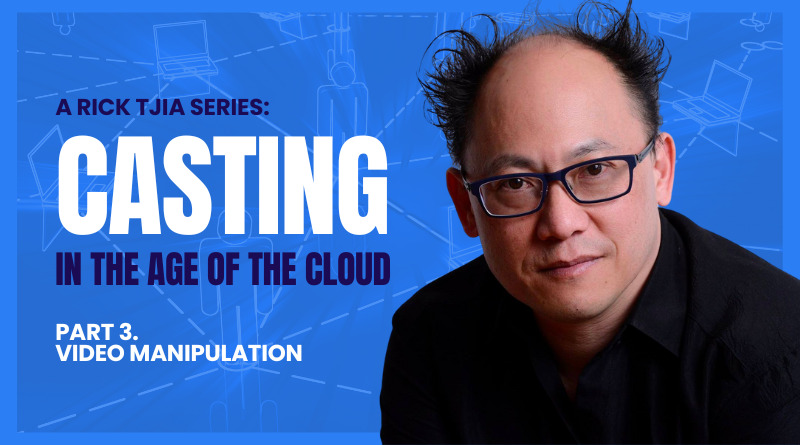Casting in the Age of the Cloud – Part 3: Video Manipulation
Next up in our series Casting in the Age of the Cloud is all about video manipulation.
When I originally planned the electricity renovations in my house many years ago, I had a future in mind where one day I would have a video editing suite in the house where I could edit professional videos at home. At the time, that idea involved machines — machines that used lots of energy, large servers that needed a certain amount of cooling. And I planned with respect to the time we lived in: 20 amp circuit breakers instead of 15 amp, #12 gauge cabling instead of the usual residential #14. More difficult to manage and manipulate than #14 cable, and more expensive. But this is what I wanted for my future.
And then suddenly, editing software became a simple computer application that could be used on a laptop. And then a mobile app for smartphones and tablets. Smartphones now shoot 4K video, and general video editing was now reduced to pulling out an iPhone, plugging in earphones, and finding a quiet place to sit and work.
Within a couple of years, the whole reason for having 20 amp breakers and #12 cable had become moot. No longer necessary. The video editing suite I had always dreamed about building in my house can now be contained in a 143.6 mm x 70.9 mm flat piece of metal and plastic I carry around in my pocket.
Showcase your talent!
Complete your profile page and add your act or show to the pool of performers being considered for hire via our talent database.
Signing up and creating your profile is FREE!
The point of this story is that things change quickly. We live in a world of trends. What was “in” last week is no longer “in” today; what was “in” 30 years ago and then one day wasn’t is once again “in” today. What was complicated and difficult for an adult to do five years ago is now a task simple enough for an eight-year-old to do. It’s an endless cycle. But not always for the best.
Today, the video length to shoot for is the ever-so-popular 60-second Instagram flash. And, in this day and age, everyone is a “videographer” and video “editor.” All the special effects one needs are integrated into pretty much all video editing apps, or at least some version of the most common ones. And since people have access to video special effects, people feel the need to use them. All of them, unfortunately. And sometimes all in the same video.
The unfortunate downside of the “fun-ness” of using all of these effects is that they are so fun. And because they are so fun, people use them indiscriminately — without contemplating pertinence. Putting my point succinctly, they have no place in an audition video.
Slow motion, fast forward, blurred effects, ultra-artistic pre- and post-production lighting effects — remember the important question I keep coming back to: Why?
As I have repeated in previous articles, the “why” is to see the limits of your technique and artistry (interpretation). Casting professionals must be able, at the very least, to see and come to some preliminary conclusion about this.
Now, the basis of technique is comprised of several attributes, among the most important:
- Control (Longevity, proneness to accidents, do you know how to land from a jump? Can you be where you need to be, when you need to be there and doing the steps that you need to be doing?)
- Speed
- Stability
- Consistency
At the risk of droning on, I’ll repeat that the purpose of an audition video demo is to show what you can do and at what level you are capable of doing it. The purpose of manipulating video is to modify what you can do — in effect, hide what you can do and what you really look like doing it. The diametric opposite of the whole objective of submitting an audition video in the first place. The moral of the story being simply: if you can’t do it in a live audition, then it doesn’t belong in an audition video.
There are a few likely outcomes to such a submission:
#1. The casting director on the receiving end gets frustrated at having spent time looking through your video and still not knowing what your skill level is. This situation often ends with your audition demo in the trash bin.
#2. The person on the receiving end will be impressed by your special effects and invite you to audition. At the audition, they realize that your skill level and artistic interpretation are not what the manipulated audition video had led them to believe, and you get cut.
#3. The person on the receiving end will be impressed by your special effects, and you get hired based solely on the video. During the contract, the production team realizes that your skill level and artistic interpretation are not what the manipulated audition video had led them to believe, and you either get let go, or are allowed to finish the contract but the production ends up not happy with the experience.
#4. Luck and timing are on your side, and everything goes great.
Of course, you could build your job application strategy on #4, luck and timing. There are people who do, and there are people who have been successful with it. But keep in mind that there is a reason that so few people win big in the lottery. There’s a reason that casinos are not in the losing business.
The question to ask yourself is: do you want to roll the dice and hope for the best, or simply set the dice down on the table with the right numbers already facing up?
.

As part of CircusTalk’s collaboration with JamarGig,a cutting-edge SaaS platform designed specifically for Casting Directors and Production companies, your CircusTalk profile now gets incredible additional exposure through the JamarGig platform to hundreds of casting directors and talent seekers across the performing arts industry. From our regularly updated Job Board and Career Lab Sessions to an assortment of professional advice articles and series, our website is an investment in your professional career. Join PRO today and ignite your career.
Looking for jobs, auditions, residency and grant opportunities?
CircusTalk PRO has got you covered!
Click here to access the CircusTalk Job Board!
.
Stay tuned for Part 4 of the series, ‘Casting in the Age of the Cloud’: 7 Video Audition No Nos. This article was originally published at DanceInforma....
Do you have a story to share? Submit your news story, article or press release.







